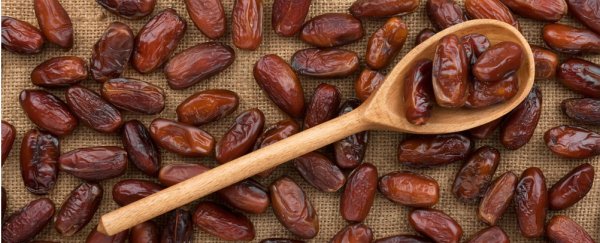If you're weaning off sugar, you may have encountered date syrup. It's thick, dark brown and super-sweet, and it's commonly used for cooking in the Middle East, to add flavour to everything from chicken dishes to desserts.
But new research suggests that date syrup might be more than a tasty marinade, and could actually contain chemical compounds that help ward off a number of bacterial infections, including those caused by Staphylococcus aureus and Escherichia coli.
Hajer Taleb, a research student from Cardiff Metropolitan University in the UK, decided to test the effect of of date syrup produced in Basra in southern Iraq on colonies of bacteria growing in a petri dish.
He identified that the date syrup contained a number of phenolic compounds that form naturally in the date fruit as it matures. These compounds, which are present in other fruits such as grapes used for winemaking, can influence the flavour, colour and texture of the syrup, and are known for their antioxidant potential. And now they're being shown to have antibacterial activity, too.
When the syrup was mixed with a range of disease-causing bacteria - including Staphylococcus aureus, Escherichia coli, Enterococcus spp. and Pseudomonas aeruginosa - it inhibited their growth in about six hours, which researchers say is faster than manuka honey, which is known for its antibacterial and wound healing properties.
Taleb also showed that artificial syrups, which are made from the constituent sugars found in dates but lack the phenolic compounds, were not as effective at inhibiting bacterial growth.
The research was presented at the Society for General Microbiology's Annual Conference in the UK this week.
"While this work is currently in vitro, it suggests that date syrup could exhibit health benefits through its antibacterial activities, similar, or in some cases, better than honey" Ara Kanekanian, a food technology expert and Taleb's supervisor, said in a press release.
While the research is still in the laboratory stage, Taleb and Kanekanian anticipate that date syrup could find clinical applications similar to honey as a topical disinfectant for wounds, used alone or in conjunction with bandages.
Who knew that dates could save lives?
This isn't even the strangest antibacterial agent that's been presented at the conference this week.
A separate team of researchers from the University of Nottingham in the UK described how they recreated a 9th Century Anglo-Saxon potion made from onion, garlic, wine and part of a cow's stomach, and watched as it wiped out 90 percent of antibiotic-resistant Staphylococcus aureus in topical applications.
This conference is now on our radar, and quite frankly, we can't wait to see what they announce next year.
